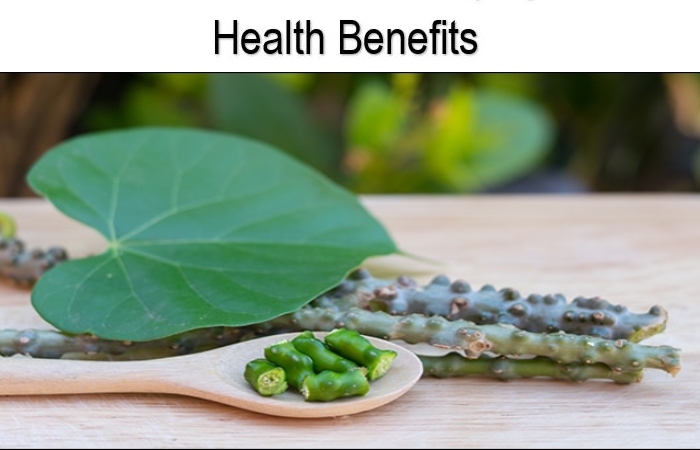Table of Contents
What is Tinospora Cordifolia?
Tinospora cordifolia is a shrub native to India. Its stems and root leaves are used in Ayurvedic medicine.
Its uses for diabetes, high cholesterol, allergic rhinitis (hay fever), upset stomach, gout, lymphoma and other cancers, rheumatoid arthritis (RA), hepatitis, l peptic ulcer (PUD), fever, gonorrhea, and syphilis to boost the immune system.
How does Tinospora Cordifolia Work?
Tinospora cordifolia covers many different chemicals that can affect the body. Some of these chemicals have antioxidant effects. Others can increase the activity of the body’s immune system. And also, certain substances may have activity against cancer cells in laboratory animals.
Most of the research has been done in test tubes or animals. There is not enough information to know about the effects of Tinospora cordifolia on the human body.
Health Benefits of Tinospora Cordifolia

1. Health benefits
- First, the crushed leaves of Tippatiga increase immunity.
- Second, it protects us from seasonal fevers, diseases, and infections.
- The antibiotic, antiviral and antifungal properties of aphids destroy the germs that enter the body.
- Additionally, Tippatiga leaf powder mixed with jaggery taken daily reduces indigestion. Improve digestive function.
- People with diabetes can inferior their blood sugar by taking Tippatiga powder regularly in the morning and evening.
- Those prone to mental stress and anxieties will get the result if they take Thippathiga powder every day.
- And also, memory increases.
- For persons with respiratory problems such as colds, coughs, tonsils, etc., the result will be good if you use Tippatiga powder.
- However, add some chopped turmeric and ginger juice to warm milk and drink it twice a day to reduce joint pain.
2. Eliminates the Accumulation of Fat
- Guduchi keeps the body’s metabolism on tiptoe so that fat doesn’t have a chance to be stored in the body.
- Instead, it is used in the form of energy, keeping the body active and healthy.
3. Improves the Functioning of the Digestive System
- As a powerful antioxidant, Guduchi removes toxins from the intestines, thus improving the digestive system.
- However, it promotes faster digestion by eliminating bloating and gas.
4. Prevents Obesity
- By promoting faster digestion and preventing the accumulation of fat within the body, Guduchi acts as a powerful obesity prevention technique.
Side Effects of Tinospora Cordifolia

When taken by mouth: It is possible sr when taken for up to 8 weeks. This can cause headaches or nasal pain in some people. There is not enough reliable information to know if it can use safely for longer than 8 weeks or the side effects.
When applied to the skin: There is not enough reliable information to know whether it can use safely during pregnancy or while breastfeeding. Be careful and avoid using it.
Special Precautions & Warnings of Tinospora Cordifolia
Pregnancy and breast-feeding: Not enough is known around the use of it during pregnancy and breastfeeding. Be careful and avoid using it.
Diabetes: Tinospora cordifolia may lower blood sugar levels. Use it with caution if you have diabetes and monitor your blood sugar. The doses of your diabetes medicine may need to adjust.
“Autoimmune diseases” such as multiple sclerosis (MS), lupus (systemic lupus erythematosus, SLE), rheumatoid arthritis (RA), or other circumstances: It can make the immune system more active, and this could increase the symptoms of autoimmune diseases. If you have any of these circumstances, it is best to avoid using Tinospora cordifolia.
Surgery: It can affect blood sugar levels, so there are concerns that it could interfere with blood sugar control during and after surgery. Stop taking Tinospora cordifolia at least two weeks before your scheduled surgery.
Dosing considerations for Tinospora cordifolia
The following doses have been studied in scientific research:
For allergic rhinitis (straw fever): 300 mg of a specific aqueous extract of the stem of Tinospora cordifolia (Tinofend, Plant Sciences) three times a day for 8 weeks.
Moderate Interaction of Tinospora cordifolia
Watch out for this combination:
1. Medicines for Diabetes (Antidiabetic Drugs) Interact with Tinospora Cordifolia
Tinospora cordifolia may lower your blood sugar. Medicines for diabetes are also used to lower blood sugar. It taking drugs for diabetes may cause your blood sugar levels to drop too low. Monitor your blood sugar closely. The dose of your diabetes medicine may need to change.
Some medicines used for diabetes include glimepiride (Amaryl), glyburide (DiaBeta, Glynase PresTab, Micronase), insulin, pioglitazone (Actos), rosiglitazone (Avandia), chlorpropamide (Diabinese), glipizide (Glucotrol ), tolbutamide (Orinase) and also others.
2. Drugs that Lower the Immune System (immunosuppressants) interact with Tinospora Cordifolia
It may strengthen the immune system. Taking it with certain drugs that lower the immune system may reduce the effectiveness of these drugs.
Some drugs that lower the immune system include azathioprine (Imuran), basiliximab (Simulect), cyclosporine (Neoral, Sandimmune), daclizumab (Zenapax),
muromonab-CD3 (OKT3, Orthoclone OKT3), mycophenolate (CellCept), tacrolimus (FK506, Prograf), sirolimus (Rapamune), prednisone (Deltasone, Orasone), corticosteroids (glucocorticoids), and also others.
Conclusion
It uses hay fever, athletic performance, diabetes, high cholesterol, upset stomach, gout, an itchy skin infection caused by mites (scabies), and also many other conditions. Still, there is no decent scientific evidence to support these uses.
Also Read: INSTANT HOT POT – IMPORTANT, WORK, WHAT CAN COOK, AND MORE

